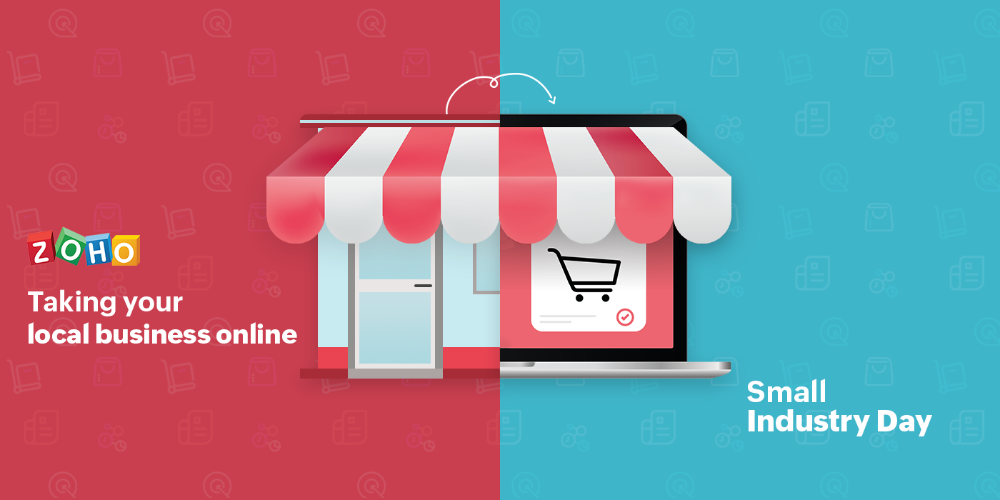
Imagine you are out shopping and find a small local shop selling a hand-carved bamboo pitcher that catches your attention. It’s beautiful, it’s handmade, and you immediately imagine using it in your kitchen. Then, like many shoppers in our digital age, you decide to go online to check if you can get it for less.
As price-savvy consumers, it’s normal to want the lowest price, and most e-commerce stores run on an “unbeatable price” business model. But in this instance, a quick search brings you to the same product, and what you see surprises you.
Bamboo pitcher comparison between Flipkart and Kalpataru Trading, a Chennai-based boutique owned by Bhavani K., who recently took her brick & mortar store online with Zoho.
The same product at the major e-commerce store is actually more expensive than what the local store is charging! So, on the one hand, you’re probably happy the local store is cheaper so you can support them and still save money, but on the other hand, you probably wonder why. Isn’t online shopping supposed to be cheaper than shopping at brick-and-mortar stores? After all, the cost of running a brick-and-mortar store is usually much greater than an online store.
Cases like these may seem commonplace and trivial, especially amidst the increasing dependence on e-commerce during the pandemic. However, the story here is ironically not about the consumer, but rather about the small and micro business owners.
Because of the lack of a digital presence, most micro and small businesses in India rely heavily on selling through large e-commerce platforms like Flipkart and Shopify because of the sheer volume of customers they draw.
However, these small businesses are often unaware of the losses they incur from the drastic price variation, monthly charges, referral fees, and other fees they have to pay based on which services they choose.
According to a recent Reuters report, select foreign e-commerce platforms like Amazon do actively undercut micro and small retailers in India. Fortunately, with technology, micro, and small businesses can now compete with online retail giants through affordable technology and better adoption support.
At Zoho, we’re committed to supporting innovation and opportunity, which means we are also committed to helping small businesses to succeed both online and in our communities.
Debunking digital transition myths
f you’re a small business owner, how many times have you reconsidered a tech upgrade, either fearing the high cost or thinking the digital method wouldn’t work as well as your traditional process? If you have, don’t blame yourself.
Until recently, these have been the prevailing notions among small businesses regarding tech. On one hand, many expect digital transformation to be expensive, complex, and too difficult to manage without extensive tech experience or a programming degree.
On the other hand, cost-effective solutions are often considered a temporary fix, something to tide you over until you invest into “big tech,” which unfortunately illustrates the old saying, “you get what you pay for.”
The perception that you will have to sacrifice quality—unless you come to the table with a lot of money—has prevailed until recently as the COVID-19 pandemic ushered in a rise in techno-optimism.
As these “high-cost fallacies” unravel, the shift to SaaS has given small business owners access to important technology at affordable costs.
The cost of professionalism
Small businesses often hesitate over a digital transition, assuming that even a straightforward cloud-based operating system might have hidden costs too. This is a valid notion, given that most small businesses in India are accustomed to both legacy systems and large e-commerce platforms known for periodic maintenance investments or increasing annual costs.
Fortunately, the benefits gained from transitioning to a SaaS e-commerce platform far outweigh these fears.
Let’s look at a local example. Bhavani K, who runs Kalpataru Trading, shifted her boutique from a Chennai-based brick and mortar only to an online storefront in the midst of the COVID-19 pandemic with Zoho Commerce. She says, “One of the main elements of shifting online was the cost-effectiveness of the transition.”
After this switch to online, Bhavani K. was also able to convert small orders into bulk orders and integrate Zoho Mail into her business communication, helping her reach a wider audience while retaining the authenticity of her small business.
To read the full article please visit Zoho.com
